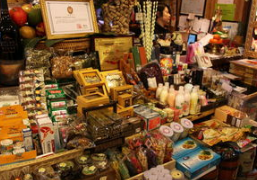Much about the pandemic sweeping across the world is unprecedented, but one aspect is all too familiar: price gouging in the wake of a disaster.
关于这场席卷全球的流行病的许多方面都是前所未有的,但有一个方面我们都太过熟悉了:因灾难而导致的哄抬物价。
In New York police arrested a man who had stockpiled medical gear, allegedly selling it for a 700% mark-up.
在纽约,警方逮捕了一名囤积医疗设备的男子,据称他将医疗设备以700%的溢价出售。
Indonesian authorities seized 600,000 masks from hoarders. In Italy the government launched a probe into sky-high online prices for basic protective equipment.
印度尼西亚官方从囤积者手中没收了60万个口罩。在意大利,政府对基本防护装备的天价网络售价展开了调查。
Such crackdowns are popular. Who could possibly endorse disaster profiteering? Many economists, as it turns out.
这样的打击很受欢迎。谁会赞成发灾难财呢?事实证明,许多经济学家会。

To be clear, it is not that they want the public to miss out on life-saving products. Quite the contrary.
需要明确的是,这并不是说他们希望公众错过拯救生命的产品。恰恰相反。
They believe that soaring prices stimulate greater output, and that policies to cap costs might limit supplies and so do more harm than good.
他们认为物价飞涨能够刺激更多产出,而限制成本的政策可能会限制供应,因此弊大于利。
In 2012 the University of Chicago surveyed 32 eminent economists about legislation that banned price gouging during a weather-related emergency.
2012年,芝加哥大学就一项立法对32位知名经济学家进行了调查,该立法禁止在与天气有关的紧急情况下哄抬物价。
Only three supported the ban; more than half criticised it. Similar views have been aired in recent weeks.
只有三人支持该禁令;超过一半的人批评了该禁令。最近几周也出现了类似的观点。
An economist with the Cato Institute, a conservative think-tank, lamented the "madness" of anti-gouging rules,
保守派智囊团卡托研究所的一名经济学家对反对哄抬物价的“疯狂”表示遗憾,
saying that profits are what entice firms to meet rising demand for safety equipment.
他表示利润是吸引企业满足日益增长的安全设备需求的原因。
Yet a closer look at one key piece of equipment—masks—during the coronavirus crisis shows that this standard view needs revamping.
然而,在冠状病毒危机期间,仔细观察一个关键设备——面罩,就会发现这种标准观点需要改进。
Economists are normally loth to tamper with prices, the most basic element of any market. But little about this pandemic has been normal.
经济学家通常不愿干预价格,而价格是任何市场的最基本要素。但是关于这次大流行的情况大部分都不正常。
Price signalling alone would have been inadequate to the challenge of ensuring vast increases in supply.
仅靠价格信号不足以应对确保供应大幅增加的挑战。
First, consider the manufacture of masks. They might look simple, but producers need sterile factories and sophisticated machinery to churn out melt-blown fabric.
首先,考虑口罩的生产。它们看似简单,但生产商需要无菌工厂和精密的机器才能大量生产熔喷织物。
Upfront costs would be hard to justify if the virus were quickly snuffed out.
如果病毒很快被消灭,前期成本将很难被证明是合理的。
So in January, the early phase of the outbreak, Chinese firms began by scouring the world for masks rather than by making more of their own.
所以在1月份,疫情爆发的初期,中国公司开始在世界各地搜寻口罩而不是自己进行生产。
It took government action to change that. Officials offered subsidies to firms producing safety gear: promising not outsized gains but an avoidance of losses.
政府采取了行动来改变这一点。政府向生产安全设备的公司提供补贴:承诺不会有太大的收益,但会避免损失。
China went from making 20m masks per day before the crisis—half the world's output—to nearly 120m by the end of February.
发生疫情前,中国每天生产2000万只口罩——占全球产量的一半,到2月底,中国的口罩产量已接近1.2亿个。
Profit, narrowly defined as the income earned from making masks, also fails to explain corporate motives. Regulation has been crucial.
利润,狭义地定义为制造口罩的收入,也不能解释企业的动机。监管至关重要。
Companies in China could not resume operations until all their workers had masks, so automakers,
在中国,只有所有工人都戴上口罩,企业才能恢复运营,所以汽车制造商、
phone manufacturers and oil giants all added mask-production lines. And big companies also want to look like good corporate citizens.
手机制造商以及石油巨头加设了口罩生产线。大公司也想让自己看起来像良好的企业公民。
Peter Navarro, a trade adviser to America's president, accused 3M, one of the world's biggest manufacturers of high-end masks, of putting money before people.
美国总统的贸易顾问彼得·纳瓦罗指责世界上最大的高端口罩制造商之一3M公司把钱看得比人还重要。
In fact, 3M has stuck to its list prices and doubled its production.
事实上,3M坚持了它的标价,并将产量提高了一倍。
Pricing is usually the best way to allocate resources, by revealing who is willing and able to pay for something.
定价通常是分配资源的最佳方式,因为它揭示了谁愿意并有能力为某物买单。
But there is no doubt now that masks are most essential for medical workers. Ordering large supplies at fixed prices is the right policy.
但毫无疑问,口罩对医务工作者来说是最重要的。以固定价格订购大量货物是正确的政策。
The public benefit of a functioning health system far outweighs any harm in impeding sellers from maximising their profits.
一个正常运转的医疗系统所带来的公共利益,远远超过了阻碍销售商实现利润最大化所带来的危害。
This was a point made to the University of Chicago's survey by one of the dissenting economists,
这是一位持不同意见的经济学家在芝加哥大学的调查中提出的观点,
who argued that it was fair to cap prices after a natural disaster.
他认为,在自然灾害之后限制价格是公平的。
"Efficiency is less important than distribution under such transitory conditions," said Angus Deaton, now a Nobel laureate.
诺贝尔奖得主安格斯·迪顿表示:“在这种暂时的情况下,效率不如分配重要。
In a global health crisis, his argument is even more compelling. Conventional morality—the revulsion against price gouging—trumps conventional economics.
在一场全球健康危机中,他的观点更加令人信服。传统道德——对哄抬物价的反感——胜过传统经济学。
来源:经济学人

参与评论